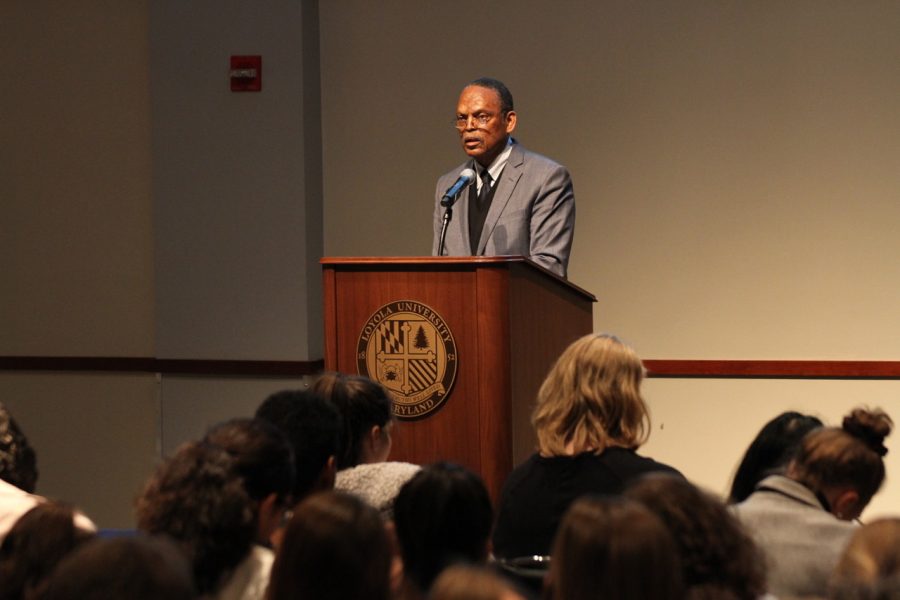On Nov. 13, William Julius Wilson, sociologist, and professor at Harvard University visited Loyola to give his “Race Relations in the Age of Trump” lecture as part of the Bunting Peace and Justice Speaker Series, which was co-sponsored by Messina, CCSJ, and Community-Engaged Learning and Scholarship.
This series was introduced on campus to bring awareness to peace and justice issues on local, national, and global scales. In his lecture, Wilson outlined the various peaks and valleys that different socioeconomic groups are experiencing in the twenty-first century and, more specifically, during the Trump Presidency.
The annual incomes of affluent black families in America have increased substantially since the age of Martin Luther King—more so than those of affluent white families. However, where upper-class African Americans have seen a vast improvement in their quality of life over the past couple of decades, life for black families on the lower end of the American socioeconomic hierarchy continues to deteriorate rapidly.
Racial antagonisms, a clear negative effect on impoverished black communities, seem to have skyrocketed since Trump’s election. These antagonisms, Wilson said, are “products of situations—of economic situations, of political situations, of social situations”—all of which can be connected to the current state of American politics.
Wilson cited affirmative action as the main stimulus for the success of the more affluent side of the black community. However, he noted that these programs “were not designed for poor blacks,” thus leading to his “very pessimistic” outlook on the future of the poorly educated black community.
In his analysis of the typical educational environment that lower-class black children experience in America, Wilson found that schools with many black and Hispanic students typically have a larger population of students experiencing poverty. Schools higher in poverty tend to also lack adequate supplies and resources for their students in addition to lacking qualified teachers.
Fewer resources and less guidance result in lower-performing students, making higher-level curriculum unnecessary and unfundable. All of these factors, Wilson concluded, contribute to the difficulty of impoverished black children seeing the relationship between education and future employment.
Wilson also considered other factors that play a role in the deterioration of America’s inner cities and poor black families. Lead contamination, home evictions, and the psychological trauma of witnessing someone killed within a child’s own neighborhood, Wilson asserted, are correlated with a lack of personal value on education.
“What I’ve always found valuable in Wilson’s writing, and this speech, is his persistent examination of the economic variability with racial groups,” said Dr. Amanda Konradi, a sociologist and Loyola professor. “We can recognize overall upward achievement trends while also acknowledging that they do not extend to everyone.”
Wilson also argued for an expansion of the current values of the Black Lives Matter movement, which has gained increased media coverage in the past few years. Even though the violence itself and the protests that arise in its wake continue to circulate on social media platforms, people have become more reluctant to talk about the murder rates within inner cities like Baltimore.
Neighborhood murder rates, or “public space violence,” as Wilson termed it, “needs more coverage than it is currently receiving.”
“It is important for students to recognize that lack of viable employment, both compatible with potential worker’s skill sets and physically accessible to them, not a lack of will to work, is strongly associated with concentrated urban poverty, such as exists in Baltimore and many other cities,” Dr. Konradi said.
“Likewise, lack of inner-city employment opportunities for adults is directly related to the ladders of educational opportunity available to their children.”
Wilson emphasized that members of all races must work together to mend the socioeconomic differences facing America today. America must find common ground, Wilson said, “to move America forward— even during the age of Donald Trump.”
Photos courtesy of Evan Visconti


















































































































